
〇月△日 午後のひととき




―Sunday afternoon. Sherry came back to the apartment house from the university.―
I just met Libre and then came back today.
I'm glad to hear that Libre can live with Fizz.
When I took a look at Rickey, he was sitting on a sofa. He drank coffee while he was looking over the documents.
His hair was still disheveled.
"Huh, okay," he said and put documents down on a table. Then he tried to take something from his bag.
"Hmmm, no? ah? I might have left papers in the office."
You left something again, Rickey. I approached him and looked at the documents he put down.
They seemed to be term assignments.
"I'm in trouble. I can't help it, I'll check them tomorrow," he said and drank coffee again.
Ha, this is your normal.
But it was unusual. You are always lazy during a holiday.
I just met Libre and then came back today.
I'm glad to hear that Libre can live with Fizz.
When I took a look at Rickey, he was sitting on a sofa. He drank coffee while he was looking over the documents.
His hair was still disheveled.
"Huh, okay," he said and put documents down on a table. Then he tried to take something from his bag.
"Hmmm, no? ah? I might have left papers in the office."
You left something again, Rickey. I approached him and looked at the documents he put down.
They seemed to be term assignments.
"I'm in trouble. I can't help it, I'll check them tomorrow," he said and drank coffee again.
Ha, this is your normal.
But it was unusual. You are always lazy during a holiday.

<今日の単語>
document 書類、文書
look over ざっと目を通す
put down ~を下に置く
lazy なまける;のろい
document 書類、文書
look over ざっと目を通す
put down ~を下に置く
lazy なまける;のろい

<今日の日本語訳>
―日曜日の昼。シェリーは大学からアパートに戻ってきた。―
今日はリバーに会って、その後はそのまま散歩して帰ってきただけ。
けれど、リバーはフィズと一緒に住めるようになってよかったな。
リッキーの方を見ると、リッキーはソファに座っていた。そして、書類を見ながらコーヒーを飲んでいた。
髪はやっぱりぼさぼさのままだ。
「ふーん、なるほどね。」リッキーがそう言ってその書類をテーブルにおくと、カバンから何か取り出そうとしていた。
「ん? ない? おや? まさか、レポートを研究室に忘れてきたかもしれないな。」
また忘れたのかい、リッキー。リッキーに近寄ってさっきおいた書類を見てみた。
どうやら学生のレポートらしい。
「まいったな。しょうがない、明日見ることにしよう。」そういうとまたコーヒーを飲み始めた。
まあ、いつものことか。
けれどめずらしい。休みの日はいつもぐうたらしているのに。
―日曜日の昼。シェリーは大学からアパートに戻ってきた。―
今日はリバーに会って、その後はそのまま散歩して帰ってきただけ。
けれど、リバーはフィズと一緒に住めるようになってよかったな。
リッキーの方を見ると、リッキーはソファに座っていた。そして、書類を見ながらコーヒーを飲んでいた。
髪はやっぱりぼさぼさのままだ。
「ふーん、なるほどね。」リッキーがそう言ってその書類をテーブルにおくと、カバンから何か取り出そうとしていた。
「ん? ない? おや? まさか、レポートを研究室に忘れてきたかもしれないな。」
また忘れたのかい、リッキー。リッキーに近寄ってさっきおいた書類を見てみた。
どうやら学生のレポートらしい。
「まいったな。しょうがない、明日見ることにしよう。」そういうとまたコーヒーを飲み始めた。
まあ、いつものことか。
けれどめずらしい。休みの日はいつもぐうたらしているのに。

<今日の日本語訳&英語訳>
―日曜日の昼。シェリーは大学からアパートに戻ってきた。―
―Sunday afternoon. Sherry came back to the apartment house from the university.―
今日はリバーに会って、その後はそのまま散歩して帰ってきただけ。
I just met Libre and then came back today.
けれど、リバーはフィズと一緒に住めるようになってよかったな。
I'm glad to hear that Libre can live with Fizz.
リッキーの方を見ると、リッキーはソファに座っていた。そして、書類を見ながらコーヒーを飲んでいた。
When I took a look at Rickey, he was sitting on a sofa. He drank coffee while he was looking over the documents.
髪はやっぱりぼさぼさのままだ。
His hair was still disheveled.
「ふーん、なるほどね。」リッキーがそう言ってその書類をテーブルにおくと、カバンから何か取り出そうとしていた。
"Huh, okay," he said and put documents down on a table. Then he tried to take something from his bag.
「ん? ない? おや? まさか、レポートを研究室に忘れてきたかもしれないな。」
"Hmmm, no? ah? I might have left papers in the office."
また忘れたのかい、リッキー。リッキーに近寄ってさっきおいた書類を見てみた。
You left something again, Rickey. I approached him and looked at the documents he put down.
どうやら学生のレポートらしい。
They seemed to be term assignments.
「まいったな。しょうがない、明日見ることにしよう。」そういうとまたコーヒーを飲み始めた。
"I'm in trouble. I can't help it, I'll check them tomorrow," he said and drank coffee again.
まあ、いつものことか。
Ha, this is your normal.
けれどめずらしい。休みの日はいつもぐうたらしているのに。
But it was unusual. You are always lazy during a holiday.
―日曜日の昼。シェリーは大学からアパートに戻ってきた。―
―Sunday afternoon. Sherry came back to the apartment house from the university.―
今日はリバーに会って、その後はそのまま散歩して帰ってきただけ。
I just met Libre and then came back today.
けれど、リバーはフィズと一緒に住めるようになってよかったな。
I'm glad to hear that Libre can live with Fizz.
リッキーの方を見ると、リッキーはソファに座っていた。そして、書類を見ながらコーヒーを飲んでいた。
When I took a look at Rickey, he was sitting on a sofa. He drank coffee while he was looking over the documents.
髪はやっぱりぼさぼさのままだ。
His hair was still disheveled.
「ふーん、なるほどね。」リッキーがそう言ってその書類をテーブルにおくと、カバンから何か取り出そうとしていた。
"Huh, okay," he said and put documents down on a table. Then he tried to take something from his bag.
「ん? ない? おや? まさか、レポートを研究室に忘れてきたかもしれないな。」
"Hmmm, no? ah? I might have left papers in the office."
また忘れたのかい、リッキー。リッキーに近寄ってさっきおいた書類を見てみた。
You left something again, Rickey. I approached him and looked at the documents he put down.
どうやら学生のレポートらしい。
They seemed to be term assignments.
「まいったな。しょうがない、明日見ることにしよう。」そういうとまたコーヒーを飲み始めた。
"I'm in trouble. I can't help it, I'll check them tomorrow," he said and drank coffee again.
まあ、いつものことか。
Ha, this is your normal.
けれどめずらしい。休みの日はいつもぐうたらしているのに。
But it was unusual. You are always lazy during a holiday.
ここから今日のポイントになります。


★ポイント1
He drank coffee while he was looking over the documents.
そして、書類を見ながらコーヒーを飲んでいた。
while ~ で「~をしている間に」や、「~をしている間中」という意味で使うことができます。
while he was looking over the documents は、「彼が書類を見ている間に」という意味です。
while の後は「主語+動詞」の普通の文がきます。
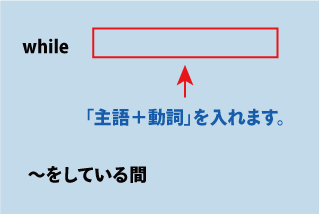
We had potato chips and coffee while we were watching television.
(私達はテレビを見ている間に、ポテトチップとコーヒーを楽しんでいました。)
また while と同じ意味では、「during」も使うことができます。
ただし「during」の後は「while」の後のように「主語+動詞」の文はおかれません。
「during」の後には「名詞」がきます。それは「during」が前置詞だからです。
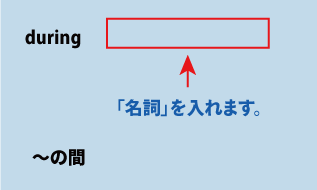
We had potato chips and coffee during the TV.
意味は同じです。
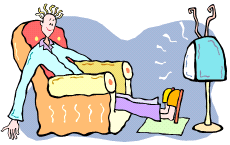
★ポイント2
"Hmmm, no? ah? I might have left papers in the office."
「ん? ない? おや? まさか、レポートを研究室に忘れてきたかもしれないな。」
I might have left papers in the office. は「私はひょっとしてオフィスにレポートを忘れてきたかもしれない。」という意味です。
「might have+過去分詞」は「ひょっとして~してしまったかもしれない。」というように、過去に対しての推量をあらわす意味で使うことができます。
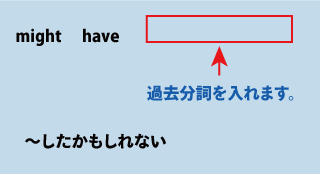
She hasn't come yet.
(彼女はまだ来ていません。)
Really? She might have missed the train.
(本当に? ひょっとして列車に乗り遅れてしまったのかもしれないな。)
(参考)
「やさしい英会話の表現Page19」でとりあげたことのある、「must have+過去分詞」は、「~したにちがいない。」というように、ある程度断定した過去にたいしての推量です。
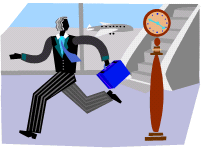
Sherry's Diary の練習問題
